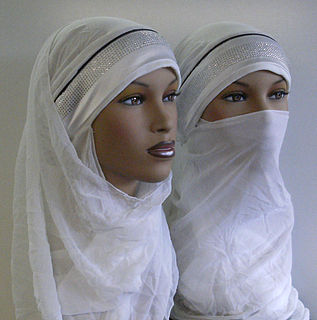 W
WA hijab is a veil worn by many Muslim women in the presence of any male outside of their immediate family, which usually covers the hair, head and chest. Another interpretation can also refer to the seclusion of women from men in the public sphere, whereas a metaphysical dimension, may refer to "the veil which separates man, or the world, from God".
 W
WThe Culture of Nakedness and the Nakedness of Culture is a book by Gholam-Ali Haddad-Adel, an Iranian scholar and intellectual, criticizing Western culture. The book focuses on the issue of women's rights and the hijab, and argues that Western clothing differs from that of Eastern societies due to the differences in their viewpoints on humankind. It also explains how Japanese clothing became Westernized.
 W
WThe Republic of Turkey has been a secular state since the constitutional amendment of 1937. Mustafa Kemal Atatürk introduced the secularization of the state in the Turkish Constitution of 1924, alongside his reforms. Atatürk never forbade the headscarf, but actively discouraged its use in public venues. The headscarf was banned in public institutions because of the 'public clothing regulation' issued after the 1980 coup and began to be implemented in a radical way after the 1997 military memorandum. The ban on the headscarf for public personnel was lifted by the democratization package on 1 October 2013 and with the amendment made in article 5 of the dress code regulation, restrictive provisions were lifted. These were in accordance with the Kemalist ideology, with a strict appliance of laïcité in the constitution. The issue of the headscarf debate has been very intense and controversial since its ban, along with other prominent religious symbols, in public buildings such as government institutions and public schools, similar to policies in France and Mexico. Turkey is a secular country and over 95% of its people are Muslims. It has resulted in a clash between those favouring the secular principles of the state, such as the Turkish Armed Forces, and religious conservatives, including some Islamists.
 W
WHijab - Mulheres de véu is a 2013 Brazilian documentary film directed by Paulo Halm.
 W
WThe word hijab refers to both the head-covering traditionally worn by Muslim women and to the concept of modesty in Islam generally.
 W
WGirls of Enghelab Street was a series of protests against compulsory hijab in Iran. The protests were inspired by Vida Movahed, an Iranian woman known as the Girl of Enghelab Street, who stood in the crowd on a utility box in the Enghelab Street of Tehran on 27 December 2017, tied her hijab, a white headscarf, to a stick, and waved it to the crowd as a flag. She was arrested on that day and was released temporary on bail a month later, on 28 January 2018. Some people believe that Movahed's action was based on Masih Alinejad's call for White Wednesdays, a protest movement that the presenter at VOA Persian Television started in early 2017. Other women later re-enacted her protest and posted photos of their actions on social media. These women are described as the "Girls of Enghelab Street" and "The Girls Of Revolution Street" in English sources. Some of the protesters claim that they didn't follow Masih Alinejad's call.
 W
WAhmad Jannati is a conservative politician. He was born in Ladan, Isfahan. Jannati is known for his anti-LGBT rhetoric and opposition to secularism. He is also a founding member of the Haghani school of thought.
 W
WMerve Safa Kavakçı is a Turkish politician, who was elected as a Virtue Party deputy for Istanbul on April 18, 1999. She is serving as the Turkish ambassador to Malaysia.
 W
WMahinur Ozdemir is a Belgian politician, with dual nationality. She is youngest and first female member of parliament with Hijab. She was expelled from Humanist Democratic Centre (cdH) for denying the Armenian genocide in 2015.
 W
WPrincess Hijab is an anonymous female street artist working primarily in Paris, France. Her art centres on veiling the main characters of subway advertisements using black paint.
 W
WThis table of types of hijab describes terminologically distinguished styles of Islamic clothing commonly associated with the word hijab.
 W
WWorld Hijab Day is an annual event founded by Nazma Khan in 2013, taking place on 1 February each year in 140 countries worldwide. Its stated purpose is to encourage women of all religions and backgrounds to wear and experience the hijab. Event organizers describe it as an opportunity for non-Muslim women to experience the hijab.